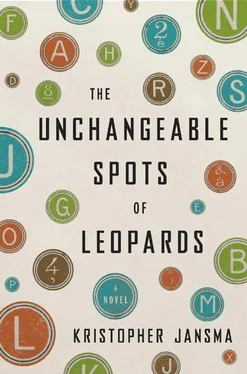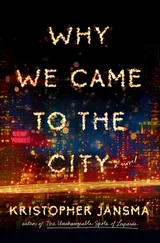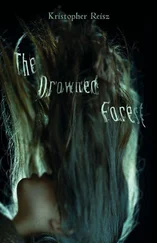Anton got out of the car. “Aren’t there perfectly good hospitals in Manhattan?”
“That’s what I said, but Rose called your dad and he said you had some rare—”
“Preposterous!” he shouted.
“—condition and that we had to go see Dr. Ivanych at his lake house. And I thought you were, you know, dying, so it seemed like we’d better get on it.”
Six cars sped past before a rusted blue Suburban slowed to stop, blocking half the neighboring lane. A large gentleman with a raccoon’s beard leaned through his passenger’s-side window.
“You got cables?” he asked.
I looked hopefully at Anton, who shrugged — possibly not even sure what jumper cables were. “We don’t know,” I admitted.
The raccoon man seemed to consider leaving us there, but it was clear that he thought a fine piece of British engineering didn’t deserve to be stuck in Yonkers with two idiots like us.
“She’s a beaut,” the man said. “Pop the hood and check your trunk for cables.”
Anton fumbled about in the front, looking for a latch for the hood. I popped the trunk, where I found two huge crates marked heavily in Cyrillic. The only English I could find was on the Customs declaration, which read PRISHIBEYEV CAVIAR — SEA OF AZOV. Beside these was a complete roadside-safety kit, thankfully including jumper cables.
I delivered these to the raccoon man. Anton was searching for his cell phone, which was ringing — the aria that ends the first act of Eugene Onegin. Suddenly I realized the phone was in the pocket of his coat, which I was wearing.
“I’ll get it,” I said. “You start your car.”
I answered the phone as Westchesterians honked and flipped me the bird as I nervously flailed at the traffic to go around us.
“Where are you?” Rose asked, her voice warming me deep down to my toes.
“We’re coming back. Anton is back to his usual, charming self again.”
Had he really called my novel terrible ?
“Anton’s father keeps calling me for updates. You’d better take him the rest of the way up there.” Through the phone I could hear Rose instruct a taxi driver to head up Madison Avenue to avoid construction.
“Where are you going?” I asked.
“The Tea Room,” she said after a pause. “I’m meeting someone.”
“I thought you had a rehearsal?”
Rose mumbled something to someone else in the cab with her, and somehow I just knew that she was with her prince.
“It’s been canceled, because of all the snow,” she lied. If the cabs were running then the show, as it were, would be going on. And she would never miss a rehearsal, which could only mean there never had been one scheduled at all. She’d lied to get me out of town. I felt sick.
There was a shout, either of pain or panic, and the roar of the Jaguar’s engine, followed by the booming bass of Tevye at the end of “Sunrise, Sunset.”
“Got to go,” I said quickly. I heard her hesitate, as if there were something else that she’d just been about to say, but then she said, simply, “Good-bye,” and hung up.
Anton was trying to tip the raccoon man when I came running back up to the car.
“Let’s go,” I barked at him. “Before somebody takes a shot at us.”
And so we eased out into the honking river of cars and headed up the highway again. As we drove in silence, I imagined pulling a U-turn through a break in the divider and heading back down to the Russian Tea Room to duel with whichever prince it was. Maybe it would move Rose to stay with me. Maybe I’d get shot and my novel would be published posthumously to great acclaim. Either way, it didn’t sound like a bad plan, compared with sitting next to Anton another minute.
“It’s nice to get out into the country for a change,” Anton said, reclining a little in his seat. I ignored him. Anton pretended he didn’t care what was bothering me for about five minutes, at which point he simply couldn’t resist anymore.
“Troubles with Rose ?” he mocked. “Is the Prince of Dullsylvania back in town?”
Though I was sorely tempted to sink into a long, disparaging discussion of Rose’s latest fiancé, a subject which Anton never tired of, I ignored the jab.
“Rose is fine. She loved my book, by the way.”
“Oh, is that your problem? Of course she loved it. It’s practically about her.”
Another long and stony silence, as I sped through the thin traffic, angrier and angrier, toward the nearest exit.
“I never meant you couldn’t fix it,” he said finally. “You’ve got a perfectly serviceable first draft.”
“You said it was terrible . And it’s my sixth draft.”
Anton reached back for the hatbox. “Well, I only got through part of it. Let me take another look.”
“Leave it!” I shouted. As we came into some small town, I suddenly wondered why I was even still driving. For weeks I’d barely heard from Anton, only finding little messes around the apartment in the morning and hearing death rattles through the walls, and here I was, motoring him up to the Siberian wastelands of Westchester to see some quack, right after he had insulted a year’s worth of my work.
“Screw this,” I said, seeing a sign for the train station up ahead. “I’m going to go back into the city.” I checked the time on my watch and figured that if I caught a train in the next half hour, I’d be back in time to make it to the Russian Tea Room. I wondered if it was still considered regicide if the prince in question had already been deposed. All I knew was that I didn’t want to be stuck in a car with Anton a minute longer, listening to Tevye asking Golde “Do You Love Me?”
“I suppose I do,” she sang.
“And I suppose I love you, too,” he replied.
“You can’t leave me here,” Anton said, looking around at the quaint little nearby shops — the sunny exterior of Paddy’s Funeral Home, the shuttered Yarn Ball, and a busy little diner named Silly Nick’s. To him, these might as well have been the gates to the gulags.
“I don’t have a license!” Anton added. “I don’t even know how to drive.”
We slowed to a stop at a red light and watched a family of brightly colored fleece jackets crossing to get breakfast at Silly Nick’s.
“You keep a Jaguar in a garage and you don’t know how to drive?”
Anton didn’t seem to understand why this wasn’t logical. “It’s my father’s car.”
“Which he left here, for you, to use in case of emergencies? With two crates of caviar in the trunk for safekeeping?”
At the mention of the caviar, Anton’s face lit up, and he suddenly opened his car door and scrambled around to the back.
“Get back in the damn car!” I shouted.
The light turned green and I had to set the car in park so I could run out after him. For the second time in an hour, I found myself standing in front of a line of furious drivers, thanks to Anton.
But Anton was exuberant in front of the open trunk. “I thought I’d lost these! My father was practically going to disinherit me over them.”
“Where did you think you had lost them?”
Anton, again, didn’t seem to understand the question. Crates of caviar, in his world, were perfectly capable of falling in and out of existence.
Before I could stop him, he had grabbed the tire iron and pried a crate open. The cars’ horns behind us were composing a collective atonal symphony. Though I was still stinging from what he’d said about my novel, I couldn’t help but begin laughing at the sight of the stringy Anton, dangling in midair as he tried to use his full weight to open the crate. At least he was earnest about things, even his abject helplessness. He had everything in the world and could do almost nothing for himself.
Читать дальше











